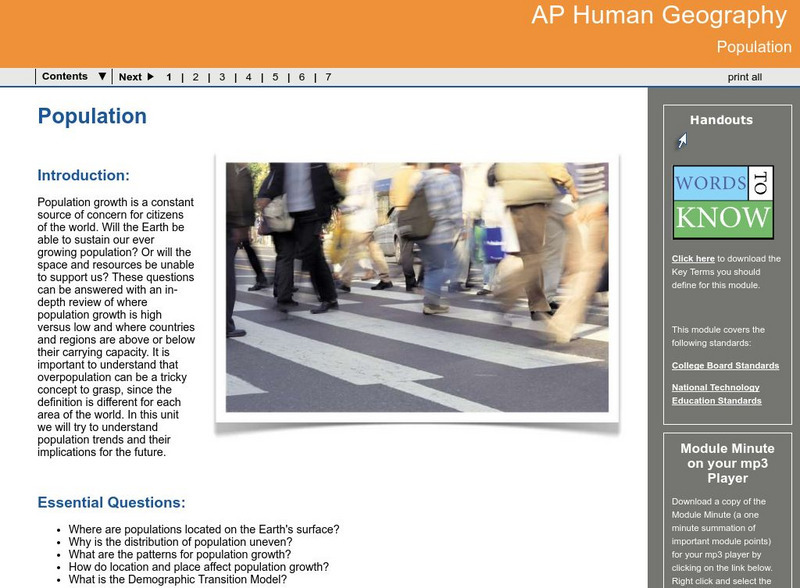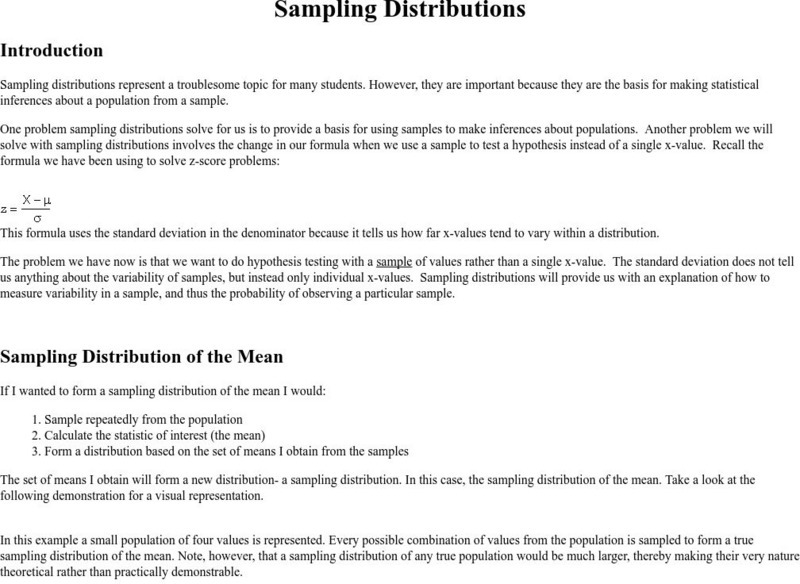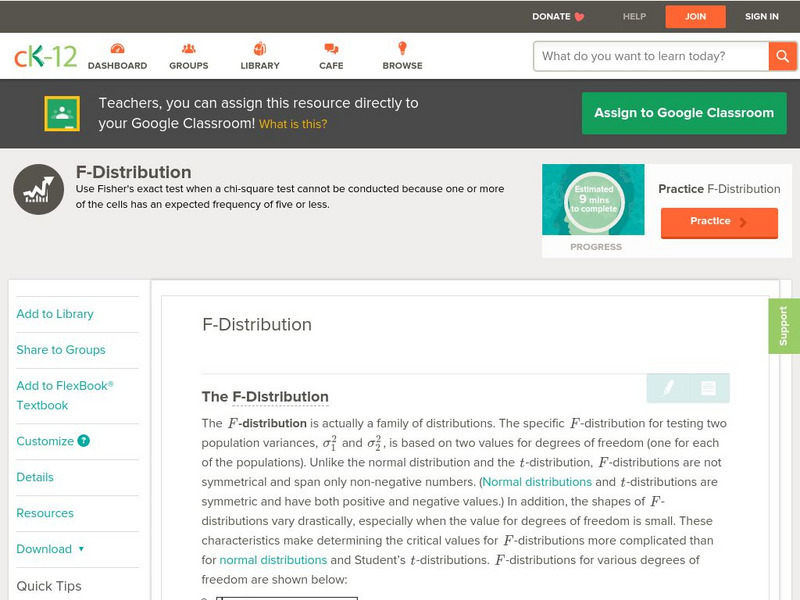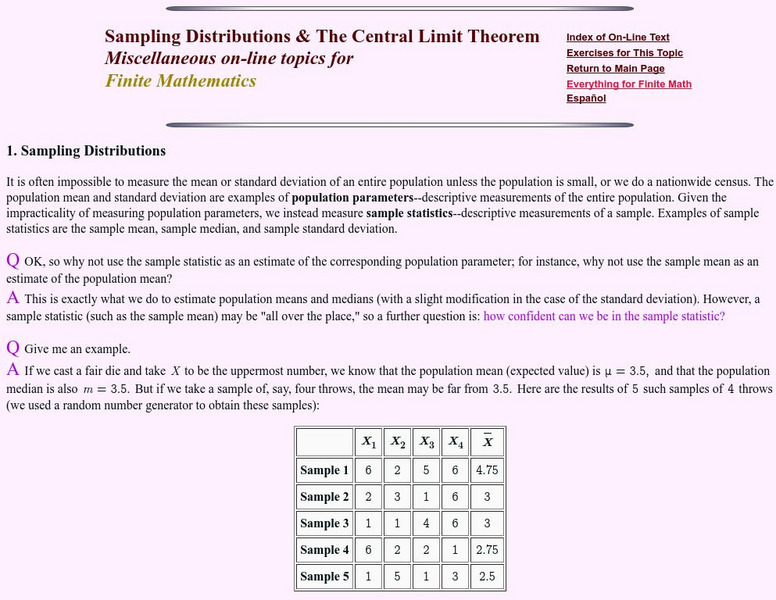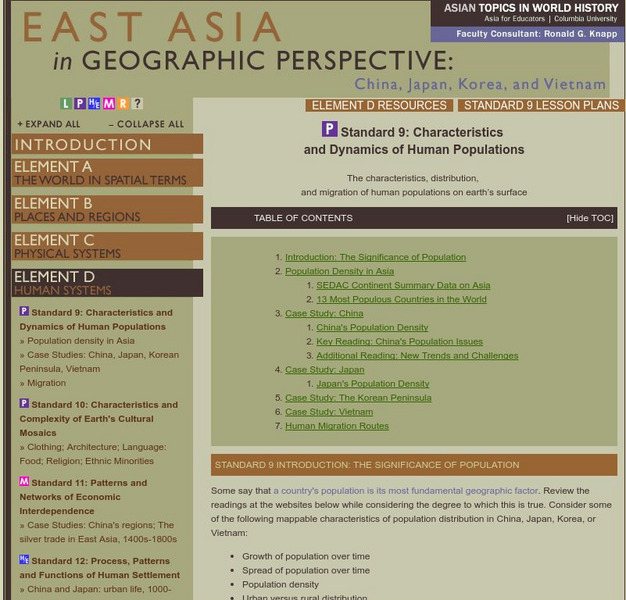Mathematics Vision Project
Module 8: Statistics
What does it mean to be normal in the world of statistics? Pupils first explore the meaning of a normal distribution in the eight-lesson module. They then apply the statistics related to normal distributions such as mean, standard...
University of Southern California
How do Organisms Interact?
Examine how organisms interact through a hands-on experience. Learners study population dynamics and distribution during an informative five-lesson unit. The focus is on the ocean environment and the organisms within it.
Mathematics Vision Project
Module 9: Modeling Data
How many different ways can you model data? Scholars learn several in the final module in a series of nine. Learners model data with dot plots, box plots, histograms, and scatter plots. They also analyze the data based on the data...
Curated OER
From Sea to Shining Sea
Students study the geography of the United States of America. Students write letters, create travel brochures, make maps, graph population numbers, read fiction and nonfiction selections, complete KWL charts, and watch films.
Practical Action
Climate Change - Who's In Control?
How can both individuals and governments respond to climate change and take responsibility to reduce its effects on our environment? Here you will find three lessons filled with discussion, debate, and role-playing...
Curated OER
Earliest Americans
Students study the Earliest Americans. In this interactive lesson on the Native Americans, students study different tribes over the course of seven lessons. Students culminate their studies with a presentation and assessment.
Curated OER
America the Beautiful
Students analyze the physical geography of the United States and how we have adapted to or altered the land to create the country we know today. Students complete maps with physical features, states and cities of interest.
Geographypods
Geographypods: Theme 1: Population and Settlement
A rich collection of highly engaging learning modules on topics related to population and settlement. Covers six main areas - population growth, population change, population migration, land use, settlement characteristics and patterns,...
CK-12 Foundation
Ck 12: Episd: Population Size, Density, and Distribution
[Free Registration/Login may be required to access all resource tools.] Students will identify and understand the significance of size, density and distribution in the population of organisms.
CK-12 Foundation
Ck 12: Biology: Population Size, Density, and Distribution
[Free Registration/Login may be required to access all resource tools.] Overview of population size, density, and distribution.
Georgia Department of Education
Ga Virtual Learning: Ap Human Geography: Population
Learning module for AP Human Geography course explores population, including factors affecting distribution and growth.
Other
Fayetteville State Univ.: Sampling Distributions
A detailed explanation of statistical sampling distributions is provided here. Several graphs are attached to aid in understanding. The sampling distribution of the mean and the Central Limit Theorem are also discussed at this site.
Other
Virtual Museum of Labrador: People
Discover the varied and diversified people that make up the population of Labrador. The four separate cultures include the Inuit, the Innu, the Metis, and the Settlers. Learn all about them.
CK-12 Foundation
Ck 12: Statistics: F Distribution
[Free Registration/Login may be required to access all resource tools.] In this Concept, students will be introduced to the F-distribution in order to test hypotheses about multiple independent population variances.
Khan Academy
Khan Academy: Comparing Distributions
Practice comparing distributions that are presented in dot plots, histograms, and box plots. Students receive immediate feedback and have the opportunity to try questions repeatedly, watch a video or receive hints.
CK-12 Foundation
Ck 12: Statistics: Sampling Distributions
[Free Registration/Login may be required to access all resource tools.] This concept introduces the sampling distribution of the mean, inferring the population mean from samples and sampling error.
Stefan Warner and Steven R. Costenoble
Finite Mathematics & Applied Calculus: Sampling Distributions and the Central Limit Theorem
Students learn about sampling distributions and the Central Limit Theorem. Topics explored are sample mean, population mean, and using the Central Limit Theorem. The tutorial investigates the statistics concepts through class notes and...
Georgia Department of Education
Ga Virtual Learning: Introduction to Epidemiology
In this comprehensive interactive tutorial you will not only learn what epidemiology is but you will also learn the role of epidemiology in public health practice. Also, you will explore the history of epidemiology to understand how its...
Other
Vancouver Aquarium: Harbor Seals
Are harbour seal populations endangered? What role does the harbour seal play in the ecosystem? How does the harbour seal reproduce? Find the answers to these questions and more in this enlightening site.
BBC
Bbc: Gcse Bitesize: Adaptations, Interdependence and Competition Aqa
The abundance and distribution of organisms in an ecosystem is determined by biotic and abiotic factors. Animals and plants have adaptations to allow them to compete for resources.
Columbia University
Columbia University: East Asia in Geographic Perspective: Standard 9
The characteristics, distribution, and migration of human populations on earth's surface
CK-12 Foundation
Ck 12: Episd: Biogeography
[Free Registration/Login may be required to access all resource tools.] Why connect biology and geography? This module will provide resources for students to understand continental drift theory, human population and its distribution, and...
McGraw Hill
Glencoe: "I'd Like to Buy the World a Coke": Student Web Activity
Students will work online using the Coca Cola Company Web site to learn about global economics. They will find the regions where Coca-Cola Company operations take place, and what economic conditions have a negative impact on sales. They...










